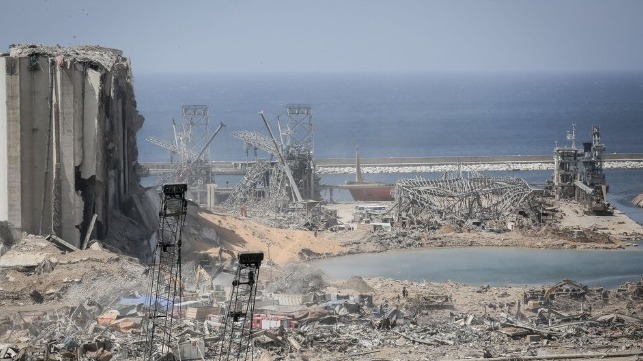Court Replaces Lead Investigator for Port of Beirut Blast

Judge Fadi Sawan, who has led the investigation into the cause of the massive blast at the Port of Beirut last August, has been removed from the case after two former ministers complained of bias. He has been replaced by Tarek Bitar, the head of Beirut's criminal court, effective Friday.
The devastating explosion was caused by a cargo of 2,750 tonnes of explosives-grade ammonium nitrate, which had arrived in Beirut in 2013 aboard the freighter Rhosus. When the owner abandoned the vessel over unpaid port fees, Lebanese officials offloaded the cargo and left it in a minimally-guarded warehouse, adjacent to a cache of fireworks.
On August 4, it caught fire and detonated, killing 204 people and injuring another 7,500. The blast ranked among the largest non-nuclear explosions in history, and it destroyed a substantial segment of Beirut's waterfront.
Among the three dozen individuals that Sawan charged in the investigation were former finance minister Ali Hassan Khalil; former public works minister Ghazi Zeaiter; a second former public works minister, Youssef Finianos; and current caretaker Prime Minister Hassan Diab.
In response, Khalil and Zeaiter filed a formal complaint alleging that Sawan was pursuing political figures in order to satisfy public demands. The court overseeing the case dismissed Sawan last week, finding that he could not be a neutral party because he refused to recognize Khalil and Zeaiter's broad claims of legal immunity - and because his own house was damaged in the explosion.
Sawan's replacement, Tarek Bitar, has served as the head of Beirut's criminal court for the past four years. He was first asked to head the explosion inquiry in August, before Sawan was selected; however, he initially turned it down because of the obligations of his existing role, according to L'Orient Today.

that matters most
Get the latest maritime news delivered to your inbox daily.
The court's decision to dismiss Sawan has been widely perceived as a sign of the enduring power of Lebanon's political class and its sway over the nation's legal system. Bitar's selection to head up the investigation has been well-received among Lebanese NGOs and civil society groups, but concerns remain about how far he will be allowed to go. "Bitar is one of the young judges of competence and reputation. But it is uncertain if he can carry out his mission without interference or pressure," wrote Nizar Saghieh, the head of NGO Legal Agenda. "The biggest question is, will he return to summoning senior people without stopping at the red line?"
Top image: Port of Beirut blast aftermath, August 9 (Mahdi Shojaeian / Mehr News / Creative Commons Attribution 4.0 International)
